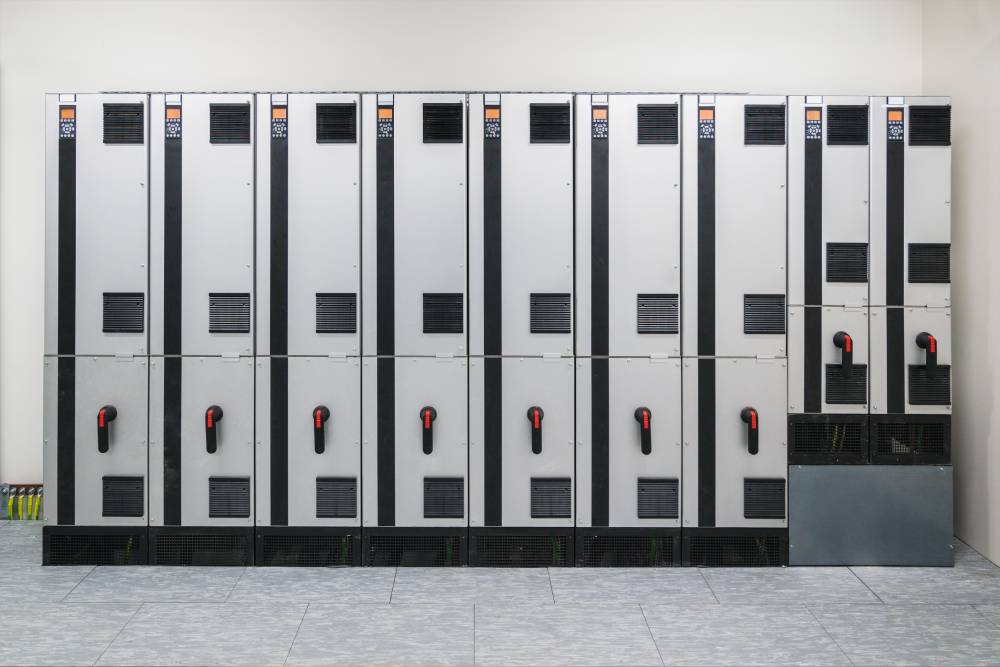- Published 22 Feb 2024
- Last Modified 6 Mar 2024
- 5 min
Variable Frequency Drives: What and Where are They Used?
Uncover how Variable Frequency Drives are transforming Australian industries such as those in manufacturing, mining and water management. Read on.

Variable Frequency Drives: What and Where are They Used
In an era where energy efficiency and process optimisation are paramount, Variable Frequency Drives (VFDs) have emerged as key players in the industrial landscape. Particularly in Australia, with its robust energy, mining, and water management sectors, the adoption of VFD technology is not just a trend but a necessity. VFDs, also known as inverter drives or adjustable frequency drives, are revolutionising how industries operate, leading to more sustainable practices and enhanced efficiency.

How Does a Variable Frequency Drive Work?
Core Components of a VFD
A VFD is a sophisticated device, integral in controlling the speed of various motors with precision. It comprises three essential components: the converter, the inverter, and the control unit. The converter plays a pivotal role in transforming alternating current (AC) power into direct current (DC), a process crucial for managing the operation of motors, from large industrial ones to small DC motors like brushless DC (BLDC) motors. The inverter then steps in, converting this DC back into AC, but crucially, at a variable frequency.
This variable frequency is key to precisely controlling the speed of the motor, whether it's a high-power industrial motor or a small electric motor used in more compact applications.
Mechanism of Speed and Torque Control
The primary function of a VFD is to regulate the speed and torque of an electric motor. This is achieved by varying the frequency and voltage supplied to the motor. In applications where the motor speed needs to fluctuate or be controlled with high precision, VFDs are indispensable. They allow motors to operate efficiently under varying loads, significantly reducing energy consumption and enhancing overall operational efficiency.
The Role of the Control Unit
The control unit of a VFD is the brain of the operation. It processes input signals, such as motor speed requirements, and adjusts the drive's output accordingly. This unit ensures that the motor operates at the desired speed and performance level, responding to changing demands in real-time.
How Do Variable Frequency Drive Systems Work in Industries?
VFDs have found a wide array of applications in Australian industries, owing to their versatility and efficiency.
Manufacturing Sector
In the Australian manufacturing sector, VFDs are used to control the speed of conveyor belts, fans, and pumps. This control leads to more efficient production processes, reduced energy consumption, and lower operational costs. For example, in food and beverage manufacturing, VFDs help maintain precise temperatures and speeds, crucial for product quality.
Mining Industry
The mining industry in Australia benefits greatly from the use of VFDs. They are used in conveyor belt systems, ventilation fans, and pumping stations. By optimising these operations, VFDs contribute to energy savings and enhanced safety in the challenging mining environment.
Water Management and Treatment
In water management and treatment, VFDs play a critical role in pump and filtration system control. They adjust the flow and pressure of water systems, ensuring efficient operation and energy use. This is particularly important in regions of Australia – such as Tasmania – where water conservation and management are essential due to environmental conditions.
Selecting a Variable Frequency Drive for Industrial Use
Choosing the right VFD for a specific application is a critical decision that can significantly impact the efficiency and longevity of industrial equipment.
Assessing Power Ratings and Load Type
When selecting a VFD, it's important to consider the power ratings and the type of load it will control. The VFD must be capable of handling the maximum power requirements of the motor or system it's controlling. Additionally, understanding whether the load is variable or constant torque can influence the choice of VFD.
Environmental Considerations
The operating environment is another crucial factor. In industries like mining, where equipment may be exposed to dust, moisture, and extreme temperatures, choosing a VFD with appropriate protective features is essential.
Compatibility and Future Scalability
Ensuring that the chosen VFD is compatible with existing systems is vital for seamless integration. Future scalability should also be considered, especially in industries that are rapidly evolving or expanding.

Future Trends in Variable Frequency Drive Technology
Integration with IoT and AI
The future of VFD technology is closely tied to the advancements in the Internet of Things (IoT) and Artificial Intelligence (AI). These technologies enable predictive maintenance, where potential issues can be identified and addressed before they escalate, thereby reducing downtime and maintenance costs.
Potential for Industry Revolution
The integration of VFDs with advanced technologies is set to revolutionise industry practices. This evolution is particularly pertinent in Australia, where industries are increasingly leaning towards automation and smart technologies for sustainability and enhanced productivity.
Explore RS’ Selection of Variable Frequency Drives
With a focus on providing state-of-the-art VFDs, RS is committed to supporting Australian industries in their journey towards more sustainable and efficient practices. Their range of VFDs is a testament to this commitment, offering solutions that are not only energy-efficient but also robust and reliable.
RS offers a diverse range of VFDs, catering to the specific needs of various industries. Their selection is designed to help Australian businesses achieve greater energy efficiency and operational excellence.
Popular Variable Frequency Drive Brands
Eaton
Eaton is renowned for its high-quality VFDs designed to meet the diverse needs of industries, such as manufacturing and mining. Their products are celebrated for their advanced control features and robust performance, ensuring energy efficiency and reliability in various industrial applications.
Delta Electronics
Delta Electronics excels in the realm of electrical efficiency, offering a range of sophisticated variable frequency drives. Known for their innovative engineering, Delta's VFDs provide precise control in challenging industrial environments, enhancing process efficiency and energy savings.
Related links
- Inverter Drives
- Mining Efficiency: How Variable Frequency Drives Are Changing the Game
- Eaton Adapter for use with Eaton Variable Frequency Drive SPX
- Siemens Inverter Drives
- ABB Inverter Drives
- Eaton External Keypad with OLED Display for use with DA1 Series Power XL Variable Frequency Drives, DC1 Series Power XL
- OPT Series Fieldbus Interface Module for Use with Variable Frequency Drives Ethernet/IP
- Eaton OPT Series Analog I/O Module for Use with Variable Frequency Drive Analogue